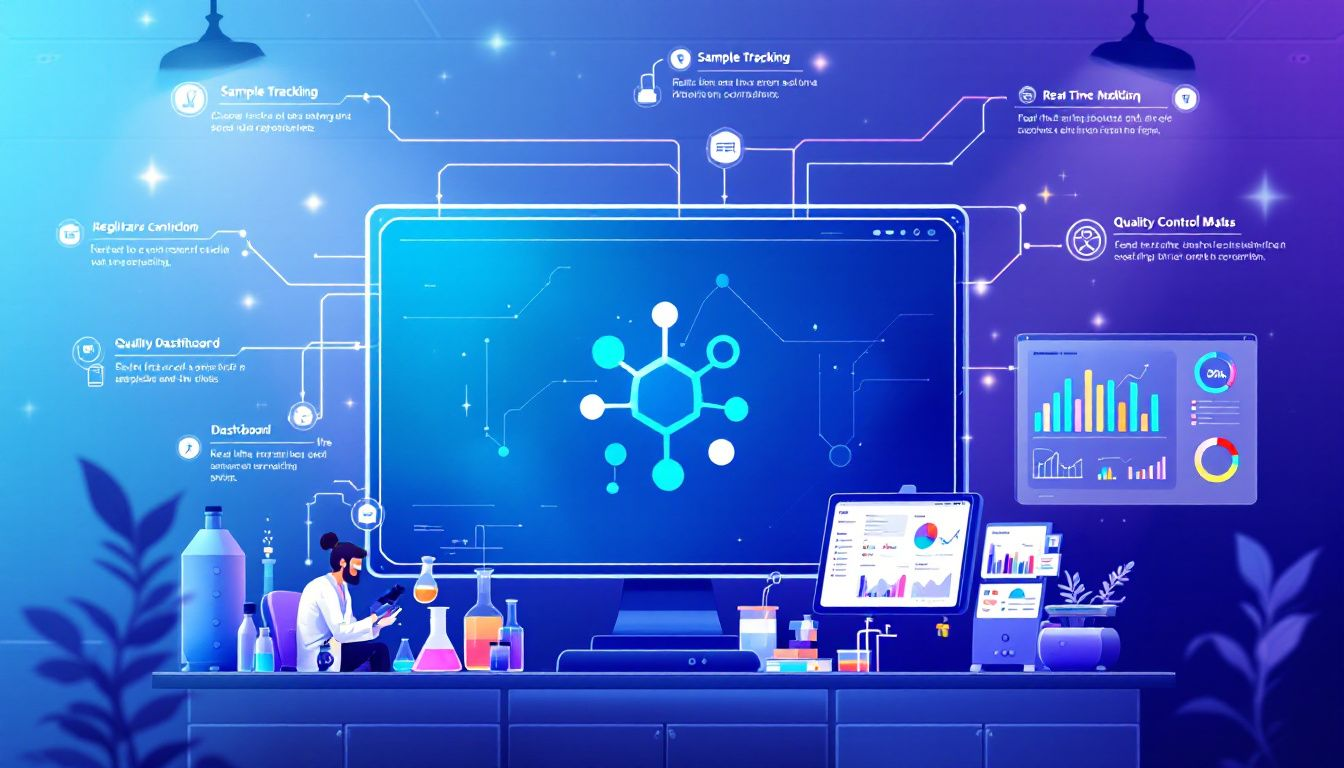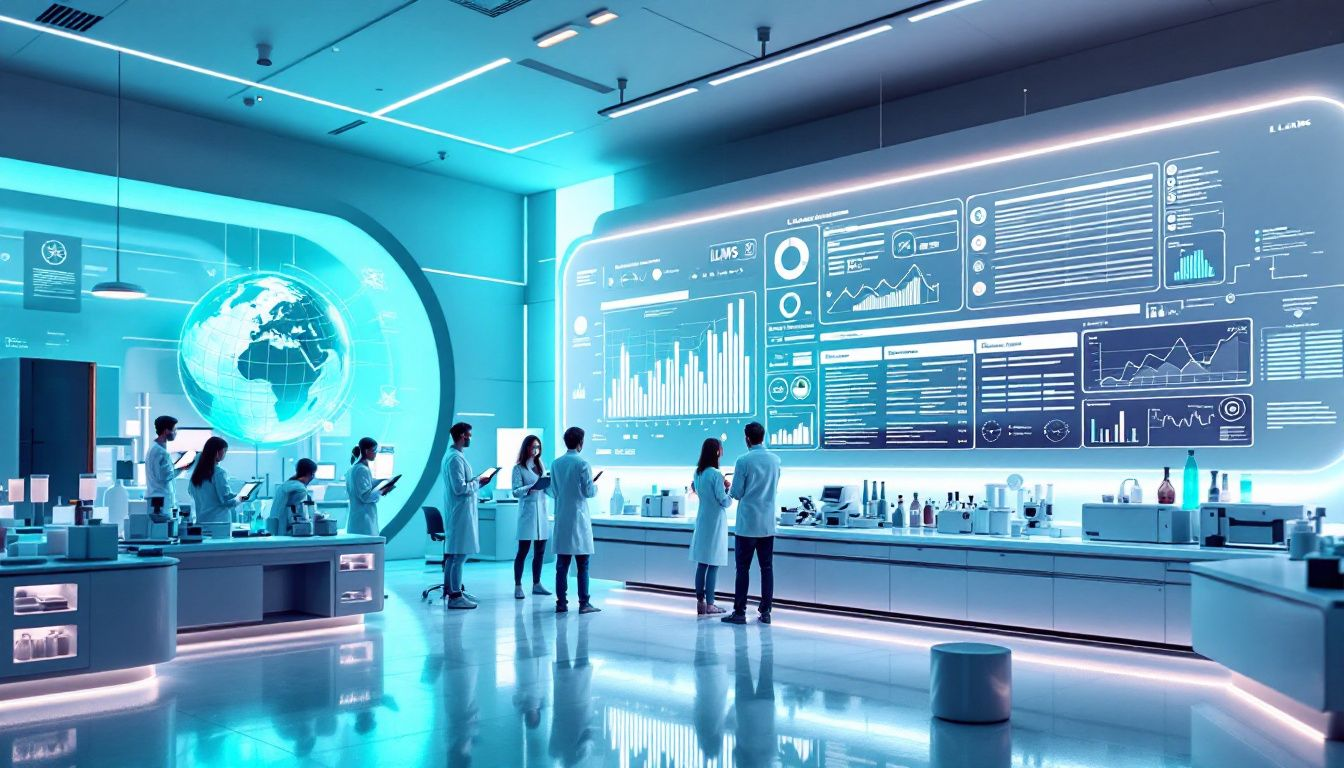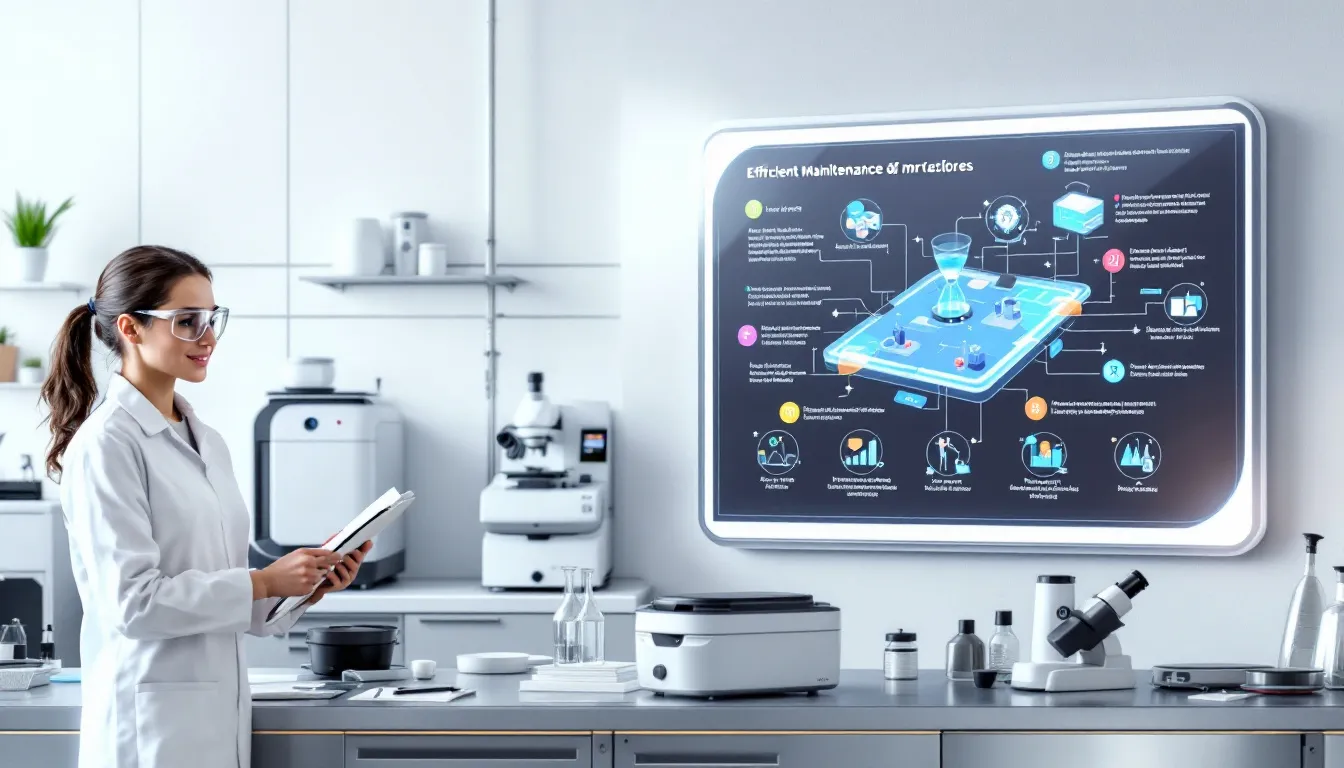LIMS Software for Pharmaceutical Manufacturers
LIMS systems are integral in streamlining data management and ensuring regulatory compliance within the pharmaceutical manufacturing industry. They play a crucial role in minimizing errors and enhancing efficiency in both production and quality control.
This article dives into the advantages, essential features, and real-world applications of laboratory information management systems in the pharmaceutical sector.
Key Takeaways
-
LIMS enhance efficiency in pharmaceutical laboratories by automating data management and ensuring compliance with stringent regulatory standards.
-
Key features of LIMS include comprehensive sample tracking, workflow management, and instrument calibration, which collectively improve laboratory operations and product quality.
-
The integration of advanced technologies like AI and machine learning within LIMS supports drug development processes, optimizing clinical trials and enhancing data-driven decision-making.
The Role of LIMS Software in the Pharmaceutical Industry

In the pharma world, LIMS are a must-have to increase efficiency and streamline lab operations. They are a solution to scheduling experiments, and centralising data to improve workflows and reduce errors. By automating lab information management LIMS are a critical asset in pharmaceutical research labs.
Following regulatory requirements is crucial for pharma companies to be compliant throughout the entire process from research to production. LIMS solutions help companies to meet these demands and increase lab efficiency. LIMS helps to consolidate operational tasks and refine workflows across the board. This level of organization helps to be compliant throughout the entire pharma process.
Lab costs decrease as LIMS optimizes resource management and streamlines many lab processes. With centralized control over compliance-aligned data handling LIMS changes how pharmacies operate at micro level managing data points with ease — leading to more output and higher quality and compliance.
Data Integrity and Compliance
Data integrity and regulatory compliance is one of the key benefits of Laboratory Information Management Systems (LIMS) in pharma. Pharmaceutical companies are governed by strict regulations from FDA and ISO. By automating data collection and reporting LIMS simplifies compliance and reduces human error risk thus data management is more precise.
In pharma labs data integrity is a critical function of LIMS. They centralise information handling so capture and storage is accurate and secure and prevent any unauthorised access. The benefits of this centralised approach is accuracy and compliance as it provides an audit trail for regulators during audits.
LIMS systems with AI integration further enhances their role in data integrity. Reduces human error—and overall efficiency in managing critical lab information for pharma companies.
Quality Control
In pharma production, QC testing is critical to ensure products meet quality specifications. LIMS helps QC labs by automating workflow management, sample tracking and data entry. Automation reduces human error and product integrity and compliance.
LIMS controls QC tests by associating samples to tests and provides live status update on each sample. This integrated approach to quality control ensures raw materials and manufacturing processes are monitored consistently to high quality and regulatory compliance throughout the entire process.
Key Features of Pharmaceutical LIMS

In pharmaceutical laboratories, laboratory operations are enhanced through the deployment of advanced Pharmaceutical LIMS that offer a suite of features to improve efficiency. The management of samples stands as one essential function within these systems, allowing for meticulous tracking and handling from when they enter the lab for quality control checks until their final disposition or storage. By maintaining rigorous oversight over sample lifecycles, these sophisticated software applications significantly bolster the effectiveness of pharmaceutical labs.
Workflow management also plays a pivotal role in augmenting productivity within a pharmaceutical laboratory by leveraging LIMS capabilities. These systems streamline procedures to ensure precise and expedited processing and monitoring of data — a crucial factor not only in boosting output but also guaranteeing adherence to stringent industry regulations.
Given such integration abilities, it is clear why LIMS has become an integral component in managing laboratory processes efficiently. They present valuable solutions centralizing compliance measures along with better overseeing both workflow and data handling—essential aspects underpinning success in modern-day pharmaceutical industries.
Comprehensive Sample Tracking
In the realm of laboratory operations, particularly within drug development, the implementation of LIMS is essential for meticulous tracking and management of samples throughout their entire lifecycle. From initial accession to eventual storage, LIMS maintains comprehensive records about each sample along with related tests. This system offers critical traceability that bolsters dependability in results across diverse lab processes.
The use of a LIMS enables immediate access to data for researchers and laboratory staff, significantly improving their ability to make well-informed choices based on current information. Such instantaneous availability underpins enhanced decision-making capacity and promotes both efficiency and efficacy in various lab activities.
Employing a consolidated approach through a LIMS ensures heightened precision and reliability when it comes to sample tracking outcomes in laboratories. This centralization fortifies the overall integrity of experimental results obtained during these complex procedures.
Instrument Calibration and Maintenance
In the realm of pharmaceutical laboratories, the meticulous calibration and upkeep of instruments are paramount for ensuring quality control. LIMS plays an instrumental role in orchestrating both the calibration schedules and maintenance routines of these lab devices to guarantee their performance remains at its peak. This oversight is pivotal in upholding test results that are not only accurate but also align with stringent regulatory requirements.
By leveraging a LIMS to automate when calibrations and maintenance tasks should occur, one significantly reduces the likelihood of human error while safeguarding consistent instrument care. The outcome is twofold: enhanced integrity in test outcomes coupled with prolonged service life for laboratory tools which subsequently cultivates cost savings alongside heightened operational efficacy.
Seamlessly weaving together instrument calibration processes and preservation efforts through a LIMS stands as an essential practice for preserving excellence and adherence to compliance benchmarks within pharmaceutical laboratory settings.
Benefits of Implementing LIMS

Implementing a LIMS within pharmaceutical labs provides a range of advantages, including heightened efficiency and superior data management. By automating intricate processes and minimizing the chances of human error, LIMS substantially bolsters operational effectiveness and optimizes laboratory procedures. This automation grants lab staff the opportunity to concentrate on more pivotal tasks, heightening productivity while diminishing potential errors.
LIMS enhance data oversight by amalgamating clinical, financial, and administrative records into one centralized system which promotes improved collaboration and communication among laboratory team members. The fusion of AI with machine learning advancements Augments the prowess of both lab informatics systems like LIMS as well as researchers’ ability to rapidly examine extensive datasets.
The progress in managing information buttresses the ongoing digital transformation in the pharmaceutical sector—ushering in an era where ‘intelligent’ manufacturing environments are integral for amplifying product quality and enhancing control over production operations.
Enhancing Laboratory Operations
LIMS are instrumental in advancing laboratory operations, particularly by streamlining intricate processes and bolstering data management strategies. Automating habitual tasks diminishes the likelihood of human error, resulting in enhanced precision within data analysis and its subsequent interpretation. A unified approach to managing information through LIMS cultivates improved collaboration among lab staff members, guaranteeing consistent access to identical datasets for more efficient teamwork.
LIMS facilitate superior experimental data handling during clinical trials by smoothing out the associated procedures while ensuring precise documentation and retention of this critical information. The advent of cloud-based LIMS amplifies these advantages with robust compliance measures and security protocols coupled with adaptability for impending advancements.
In essence, pharmaceutical laboratories greatly benefit from integrating LIMS into their systems as it significantly raises productivity levels along with better oversight over operational aspects.
Supporting Drug Development and Clinical Trials
LIMS play a crucial role in facilitating every phase of the drug development process and clinical trial execution, ensuring streamlined operations and adherence to regulatory requirements. By overseeing activities ranging from fundamental research through clinical trials to GMP (Good Manufacturing Practice) quality control stages, LIMS maintains precise and regulation-compliant data-gathering procedures. This level of comprehensive assistance is vital for the successful progression and sanctioning of novel pharmaceuticals.
Incorporating AI and machine learning technologies into LIMS significantly augments their functionality by enhancing clinical trial designs and forecasting patient responses. Such technological advancements contribute to increased efficiency within trials while simultaneously reducing the duration as well as financial outlays required for bringing new drugs to market.
Fulfilling an essential function in propelling forward both drug development initiatives and identifying groundbreaking leads, LIMS provides indispensable backing to scientific investigators dedicated to discovering innovative medical treatments.
Overcoming Challenges in Pharmaceutical Manufacturing with LIMS
The integration of Laboratory Information Management Systems (LIMS) within pharmaceutical laboratories frequently encounters distinct difficulties, especially in the realms of data management and adherence to regulatory compliance standards. A prevalent concern is establishing potent protocols for managing data that can alleviate potential non-compliance risks during the process of incorporating LIMS. Many labs face hurdles with ensuring their various systems work compatibly together.
In response to such obstacles, it’s advantageous for pharmaceutical companies to adopt middleware solutions tailored towards enhancing system interoperability—facilitating seamless communication between disparate platforms. Addressing these issues head-on allows laboratories to effectively implement LIMS and harness its benefits, which include heightened efficiency in operations, adherence to compliance mandates, and superior handling of laboratory data.
Ensuring Data Security
In the realm of pharmaceutical laboratories, ensuring data security is paramount when implementing Laboratory Information Management Systems (LIMS). To safeguard critical pharmaceutical data, robust security features such as encryption and stringent access controls are indispensable within a LIMS framework. Authenticating users through methods like role-based access control ensures that only qualified individuals have access to delicate information, thereby preserving proprietary knowledge and thwarting potential data breaches.
Integrating lab instruments directly with LIMS can curtail the need for manual inputting of data, thus lowering the likelihood of human error and bolstering the integrity of the data collected. These precautionary measures are vital in upholding both confidentiality and reliability of laboratory findings. They enable pharmaceutical labs to adhere to regulatory mandates while securing their invaluable research endeavors.
Meeting Intense Regulatory Scrutiny
Operating within an environment of intense regulatory scrutiny, pharmaceutical companies rely heavily on Laboratory Information Management Systems (LIMS) to meet and maintain compliance with rigorous standards. LIMS are instrumental in upholding data integrity and adhering to FDA as well as ISO guidelines through the application of strict validation processes—key factors that are essential for not only advancing drug development but also securing approvals from authorities and maintaining their confidence.
With the aid of LIMS, pharmaceutical entities can produce precise audit trails and thorough documentation, which greatly simplifies the process of demonstrating adherence to regulatory mandates during inspections. These comprehensive records are indispensable for fulfilling regulatory obligations while safeguarding sensitive data against any unauthorized breaches. Consequently, by tackling these demands posed by regulations head-on, LIMS empowers pharmaceutical firms in steering through the intricate journey encompassed by drug development and clinical trial management.
Future Trends in Pharmaceutical LIMS

Emerging trends in laboratory information management systems (LIMS) are poised to revolutionize the pharmaceutical industry, particularly through incorporating AI and machine learning capabilities. This integration is crucial for enhancing the efficiency of data analysis and decision-making within pharmaceutical laboratories. By leveraging these technologies, large volumes of data can be analyzed swiftly and accurately, thereby expediting the identification of potential biological targets throughout drug development and refining clinical trial protocols.
Advancements like in silico modeling herald a new era in drug development by minimizing dependence on conventional empirical approaches. Innovations also extend to analytic techniques such as mass photometry, which are essential for verifying the quality and strength of intricate personalized medications.
These progressive developments indicate a significant shift toward improved precision in pharmaceutical manufacturing processes. Consequently, this leads to treatments that are not only more targeted but also potentially more effective at addressing various health conditions.
Summary
In summary, LIMS is changing drug development in the pharmaceutical industry by strengthening data integrity and quality control in the lab. LIMS in pharma labs brings many benefits including increased efficiency, reduced human error and compliance to regulations. Case studies prove the practical benefits of LIMS — more productivity and quality assurance.
The future of LIMS in pharma is looking exciting with technological integrations like AI, machine learning and virtual modeling. These technologies will take LIM systems to the next level and support more innovative research and better patient care. Companies that adopt these technologies will be ahead of the curve and will be key to driving successful R&D programs.
FAQs
What is a Laboratory Information Management System (LIMS)?
A software solution called a Laboratory Information Management System (LIMS) manages data in the lab, increases operational efficiency and compliance to regulations. This system helps labs to streamline their processes while keeping their data intact. What is a Laboratory Information Management System?
How does LIMS improve data integrity?
By recording data accurately and securely and providing traceability and audit trails to prevent unauthorized access, LIMS improves data integrity.
What are the features of a pharma LIMS?
The features of a pharma LIMS include sample tracking, instrument calibration and maintenance, automated data management and workflow optimization.
These are the essentials for efficiency and compliance in the lab.
How does LIMS support drug development and clinical trials?
LIMS helps in pharma development and clinical trials by streamlining workflows, compliance to regulations and fine tuning clinical study design.
This level of support is critical for refining processes and results in pharma research.
What are the hurdles in pharma LIMS?
Pharma LIMS implementation faces data management and compliance issues, interoperability and data security.
Share this
You May Also Like
These Related Stories

Maximizing Efficiency with LIMS Reporting: A Practical Guide for Labs

Optimizing Lab Maintenance: Best Practices for Optimal Performance


Comments (1)